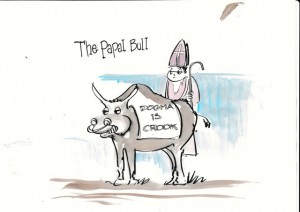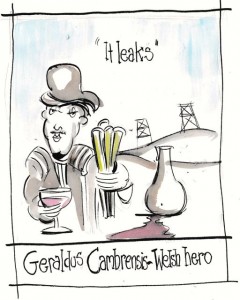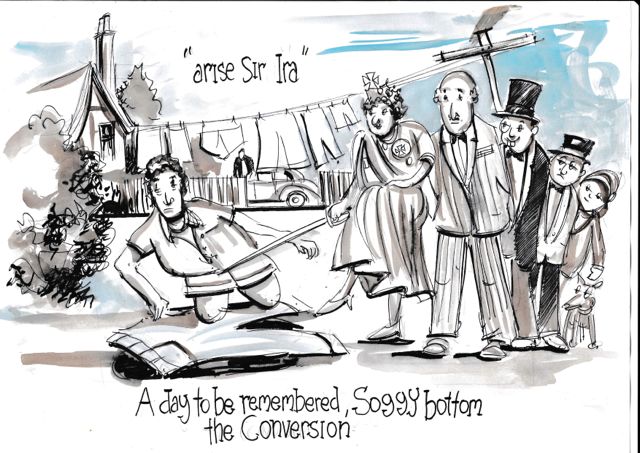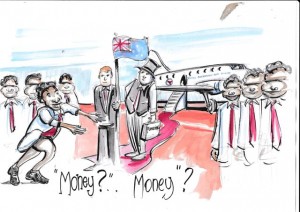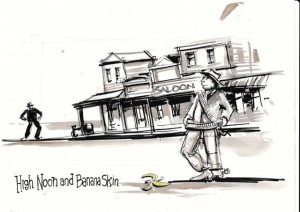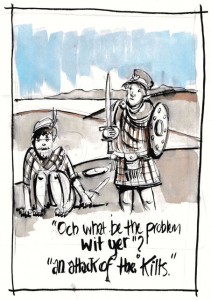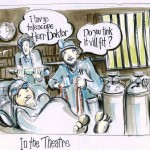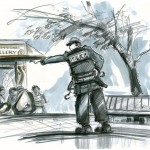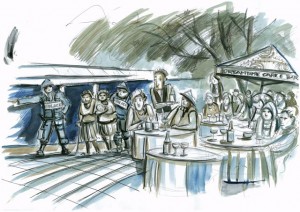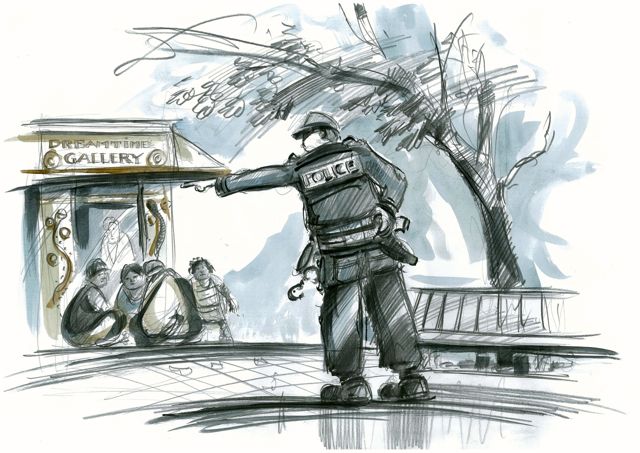Monarchy. by Tarquin O’Flaherty
In London, in the 1640’s, the parish register of St. Giles-in-the-Fields talks about ‘…a poor gentleman undone by the burning of a city in Ireland… his goods cast away… poor plundered Irish…’
But this was the exception. Generally the attitude was much more hostile. The feeling was more akin to the view at the time that. ‘…this realm has, of late been pestered with a great number of Irish beggars, who live here idly and dangerously, and are an ill example to the natives…’.
This second attitude makes no allowance, gives no hint whatever that the Irish were crowding London and other English cities, not because they wanted to be there, but because they’d been burnt out, disenfranchised and driven off their land in increasing numbers by successive English monarchs who could put these newly acquired, newly liberated lands to much better use.
The Irish, literally, had nowhere else to go. For almost the next three hundred years, both the Jews and the Irish, in London, shared an equal pariah status.
All this Murderous Monarchy business got a head start when the Normans invaded Ireland shortly after 1066. By 1155 the Pope had issued a Papal Bull to the then king of England, Henry the Second, giving him the right to invade Ireland, slaughter the inhabitants and seize their possessions. Just…like… that.
Geraldus Cambrensis, a spineless Welsh collaborator (with the Normans) made the following observation at the time;
‘…they live like beasts…this is a filthy people, wallowing in vice….least instructed in the rudiments of the faith…don’t pay tithes…don’t marry…practise incest…’.
What else can you expect from a Welshman, who lives on his knees, and on his neighbours?
In the intervening period the verbal barrage continued, as greater or lesser atrocities were committed, with the express intention of demonising the Irish in the name of God.
‘…how Godly a deed it is to overthrow so wicked a race…’
This was said after the Earl of Essex, Queen Elizabeth’s favourite at the time, had slaughtered the entire population of Rathlin Island, Co Antrim, in 1575.
By 1634 it was proposed by Lord Stafford, Lord Lieutenant of Ireland, that the Irish be denied the right to manufacture their own woollen garments. This would force them to buy English made clothing and bedding. By 1660 the Irish were forbidden to export either wool or woollen goods.
The Irish got sick of all this and had themselves a bit of a rebellion. Oliver Cromwell (the king you have when you don’t have a king) took his Model Army to Ireland, and, in defeating the opposition, caused a famine. This was quickly followed by bubonic plague. After just four years in Ireland the population of Ireland was halved. No real figures were kept but a reasonable count of the dead was between 700,000 and a million. In just four years.
‘…Ireland is like a half-starved rat…squelch it, by Heavens, squelch it!…’ Thomas Carlyle, philosopher and writer, friend of Leigh Hunt, Emerson and other notables.
If we move up to the nineteenth century where the Irish are once more literally starving to death, a fate they had apparently wished on themselves, well then, it was entirely their own fault. George Trevelyan, head of Famine Relief in Ireland believed that;
‘…it was the judgement of God to teach the Irish a lesson…and that calamity(the Famine) must not be mitigated….’ In 1848 he closed the stores supplying Famine Relief so that the Irish would not become dependent on English generosity. Hundreds of people died.
According to “The Great Hunger”, by Cecil Woodham Smith the population of Ireland before the Famine was perhaps 6 or 7 million. By the 1850’s it was two million, where it stayed for 100 years.
Charles Kingsley went to Ireland in the 1850’s and wrote;
‘…I am haunted by the human chimps I saw…to see white chimps is dreadful…if they were black one would not see so much, but their skins are as white as ours.’
Charles Kingsley was a Cambridge historian. He was talking about Irish people.
The English labourer in 1914 was so malnourished as to be unfit for active duty so Irishmen were actively recruited instead. Quite a few Irishmen stayed at home and declared war on England. The Irish won.
This might help you make up your mind regarding my attitude to Monarchy.
———————————————————————————
In an attempt to maintain our high standards we have rejected the following illustrations, lovingly prepared by our monarchist Illustrator Sir Bertram Postule.

